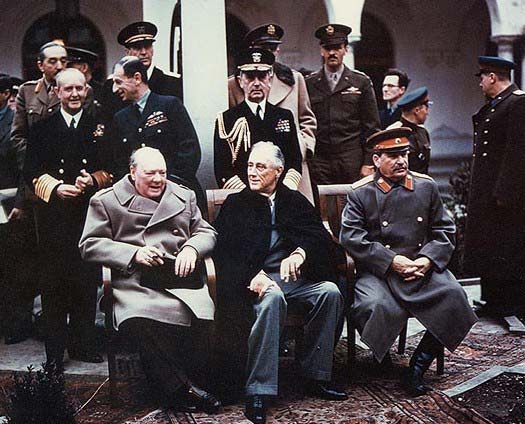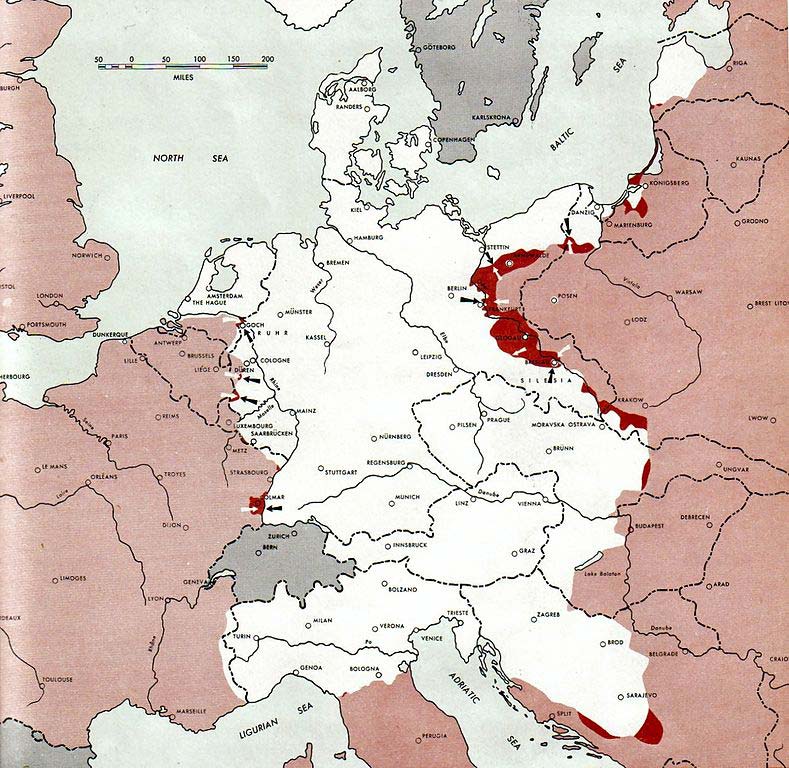 Yalta Conference, also known as the Crimea Conference, was a conference that was held in a Russian resort town in Crimea in 1945 between February 4th and 11th. This conference brought together the heads of government of the U.S., U.K., and the Soviet Union.
Yalta Conference, also known as the Crimea Conference, was a conference that was held in a Russian resort town in Crimea in 1945 between February 4th and 11th. This conference brought together the heads of government of the U.S., U.K., and the Soviet Union.
The delegations of the conference were led by Joseph Stalin Soviet’s premier, Franklin D. Roosevelt American president and Winston Churchill the then British Prime minister or as they were commonly known the big three. It was not the first time that the 3 leaders were meeting as they had formerly met in November 1943.
This was the second of the three war-time conferences held among the three allies represented by the three leaders. It was followed the Tehran Conference which was later followed by the Postdam Conference.
 Initially, Roosevelt had suggested that they meet somewhere neutral at the Mediterranean. His suggestion was met by opposition from Stalin who cited health concerns that prohibited him from making long trips. In place of the Mediterranean, Joseph Stalin proposed the sea-resort of Yalta an ancient city on the shores of the Black Sea, which all the leaders agreed upon.
Initially, Roosevelt had suggested that they meet somewhere neutral at the Mediterranean. His suggestion was met by opposition from Stalin who cited health concerns that prohibited him from making long trips. In place of the Mediterranean, Joseph Stalin proposed the sea-resort of Yalta an ancient city on the shores of the Black Sea, which all the leaders agreed upon.
The location of the conference was in Stalin’s favor as the soviet troops were a few miles from Berlin. This was also backed by the home ground advantage of hosting the conference in the USSR. Nevertheless, the eagerness to meet face to face made Roosevelt agree to Stalin’s request.
The Conference
This meeting was held in a resort town on the Crimean peninsula. All the delegation was staying in different chambers. The delegation from the U.S. was housed in the former palace of Tsar while Roosevelt stayed at the Livadia place. The British side delegation stayed in Prince Voronsov’s castle. The main delegates present in the conference were; Averell Harriman, Anthony Eden Vyacheslav Molotov, Edward Stettinius, and Alexander Cadogan.
The conference commenced with an official dinner on the eve of February 4th. Some significant achievements were made in the meeting. The powers agreed that the unreserved surrender of Nazi Germany was a priority. The other pressing issue was the partitioning of Berlin and German. In regard to Germany, the leaders agreed that the defeated nation would be partitioned into 3 zones of occupation for each and every of the allied powers.
They agreed that Germany would be split into 4 occupied zones after the war. Joseph Stalin also agreed to allow France to acquire the fourth occupation zone in Germany and Austria drawn from the British and U.S. zones. It was also decided that France would get a seat in the ACC (Allied Control Council).
All the allied powers came with their its agenda to the conference. Of major importance to Roosevelt was founding of the UN and involvement of Stalin the war against Japan. During the conference, the leaders discussed Europe’s post-war reorganization, in particular the borders of Poland where war had erupted 6 years prior, and the fate of Japan, whose continued stubbornness kept the U.S. at war after the fall of Germany.
The British wanted to preserve their empire, and the Soviets wanted to acquire more land so as to strengthen their conquests. During the negotiations they released a declaration on Poland that provided for the inclusion of Communists in the post-war national government. They agreed that the eastern border to Poland would be along the Curzon line and that Poland would obtain substantial territorial compensation from Germany in the west.
Roosevelt had two main objectives in the conference held in Yalta which he managed to secure. He strongly believed that the only thing that would keep the U.S. from slipping back into isolation after the war was the U.N. He also wanted to make Joseph Stalin commit himself to involvement in the war against Japan and membership in the United Nations. Joseph Stalin agreed to get involved in the battle against the Empire of Japan in ninety days following the defeat of Germany. It was arranged that the USSR would obtain the southern part of Kurile and Sakhalin islands after conquering Japan.
Initially, the Yalta agreements were received with celebrations. Like Most Americans, Roosevelt viewed the agreements as proof that the spirit of American-Soviet wartime alliance would continue even after the war period. However, this was not to be as with the passing on of Roosevelt in April 1945, the new administration clashed with the USSR over their influence over the UN and in Eastern Europe. During the meeting Stalin was able to take advantage of the new president of America Harry S. Truman and have the decisions of Yalta ratified. He also managed to have a change of power in Britain, which saw Winston Churchill replaced by Clement Attlee along the way through the conference.
The Aftermath of the Conference at Yalta
The decisions produced in the conference that was held in Yalta are among the most important of the 20th century and probably modern History. This conference was the last trip abroad for Franklin D. Roosevelt. His main objective was to ensure the participation of the USSR in the UN which he accomplished at the price of giving veto power to every member of the Security-Council. Franklin D Roosevelt, Churchill and Stalin shaped up much of the modern world and propelled into motion the creation of the world’s first real world government: the U.N.
The development of order in Europe and reconstruction of the national economic life under the Marshall plan were also achieved by the processes that facilitated the liberated people to get rid of the last remnants of fascism and to establish independent democratic institutions. This is one of the principles of the Atlantic Charter which states that all people have the right to vote for the form of government under which they will live. It restored the sovereign rights of all citizens who had been forcibly denied of them by the aggressor nations.
Stalin benefited greatly from the conference getting everything he wanted. He got a huge area of influence in the name of a buffer zone. In the process the autonomy, small countries were somehow compromised and forfeited for the sake of stability. That meant that the Baltic countries continued to be members of the USSR.